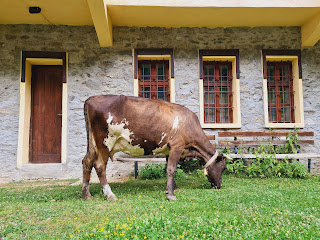One of my favorite childhood books was Heidi by Johanna Spyri, published in 1880. The story is set in Switzerland and follows a young orphaned girl who goes to live with her grandfather in the Alps.
The book beautifully describes nature, natural foods, healthy living, love, and compassion through Heidi's eyes. I vividly remember Heidi enjoying fresh raw goat's milk, cheese, and dark bread prepared by her grandfather. The sweet way she drinks her milk in the book is stuck in my memory for eternity.
When I was a child, my grandmother used to buy fresh cow milk from a local farmer who delivered it to her home. He would bring two glass bottles full of fresh milk and take back two empty bottles.
My grandmother often told me a story about my uncle, who was very sick as a child and almost died. However, he completely recovered after consuming goat milk every day for 1 year. As a result, they bought and kept about 50 goats in their village, producing cheese and other dairy products. I even tried milking the goats during my visits to my grandmother in summer, although I didn't quite get the hang of it!
This led us to wonder: What does raw milk taste like? Is it as good as Heidi describes? What are its health benefits and risks? And can we buy it in the Macedonia?
 |
| Woman and her goats, v.Bukovo |
Buying raw milk in Macedonia is relatively straightforward, given the country's robust dairy industry. There are several ways to access raw milk for both personal and commercial use:
 |
| Flock of sheep on a near hill in Bitola |
 |
| Cow in the village Malovishte |
Raw milk has a rich, creamy taste that many people find superior to pasteurized milk. Its flavor can vary slightly depending on the diet and breed of the cows, sheep or goats. According to advocates, raw milk retains more natural enzymes and nutrients, which some believe can aid in digestion and boost the immune system. However, it also carries risks, such as the potential for harmful bacteria like E. coli, Salmonella, and Listeria, which can cause serious illness.
In Macedonia, raw milk is available through local farms and markets. You can find it by visiting farms directly or by exploring farmers' markets where local producers sell fresh dairy products. Ensure that any raw milk you purchase comes from a reputable source that adheres to proper hygiene and safety standards.













No comments: